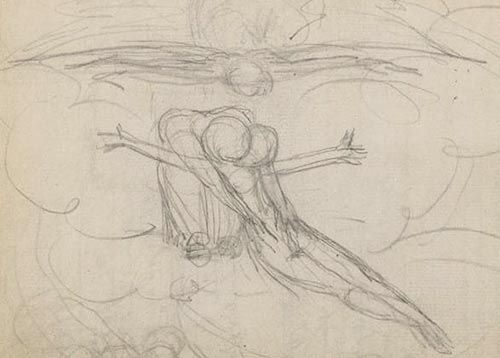
Let us pray (in silence) [to God the source of all being, through the eternal Word, in the power of the Holy Spirit]
pause
Almighty and everlasting God,
you have given to us your servants grace,
by the confession of a true faith,
to acknowledge the glory of the eternal Trinity,
and in the power of your divine Majesty to worship the Unity,
may we, through the steadfastness of this faith,
evermore be defended from all adversities;
through Jesus Christ
who is alive with you,
in the unity of the Holy Spirit,
one God, now and for ever.
Amen.
The above is my reworking for my Book of Prayers in Common in which I seek to provide a set of collects with history and commentary.
Trinity Sunday is a Feast Day, hence this collect is not used during the week following – the collect on weekdays, this year, is that for Ordinary Week 10.
Trinity Sunday is notorious for, through attempted explanations of the Trinity, oversimplifying the doctrine to the point of affirming exactly what the doctrine is not trying to convey. Sermons regularly erroneously stray into tritheism/polytheism (that there are three gods); modalism (that there are three forms of God – like steam, liquid, and ice); and Subordinationalism (God the Father is the greatest. Coming in second is God the Son, followed by the second runner-up, the Holy Spirit).
Click on the following link to read my commentary and reflection on Trinity Sunday and its collect: Trinity Sunday.
The following may be another useful quote:
A world of one dimension would be a straight line. In a two-dimensional word, you still get straight lines, but many lines make one figure. In a three-dimensional world, you still get figures but many figures make one solid body. In other words, as you advance to more real and more complicated levels, you do not leave behind you the things you found on the simpler levels: you still have them, but combined in new ways–in ways you could not imagine if you knew only the simpler levels.
Now the Christian account of God involves just the same principle. The human level is a simple and rather empty level. On the human level one person is one being, and any two persons are two separate beings- just as in two dimensions (say on a flat sheet of paper) one square is one figure, and two squares are two separate figures. On the Divine level you still find personalities; but up there you find them combined in new ways which we, who do not live on that level, cannot imagine. In God’s dimension, so to speak, you find a being who is three Persons while remaining one Being, just as a cube is six squares while remaining one cube. [Mere Christianity, C.S. Lewis p. 137-138]
Further resources for Trinity Sunday may be found at Textweek.
If you appreciated this post, remember to like the liturgy facebook page, use the RSS feed, and sign up for a not-very-often email, …




I love the Blake sketch, Bosco. I’d never seen it before. It has all the same iconographical elements as the image of the Trinity on the reredos in our college chapel here in Toronto (https://c1.staticflickr.com/4/3758/12310185216_eb7b8d3e81_b.jpg), but Blake’s depiction of the Father’s embrace of the Son is much more moving.
Yes, Jesse. As you indicate, the iconographical elements are traditional – but it’s far more embrace than simply presentation. Blessings.
I found this Collect didn’t read well to me, Bosco, and I wonder if people coming across it for the first time would find it easy to understand. So, some thoughts:
Almighty and Everlasting God,
You have given to us your servants grace,
This second line is the most confusing: it reads as if we’re about to say ‘your servants’ grace’ except that we discover there’s no apostrophe. I know the language is trying to be formal, but it would make a lot more sense to the reader to say:
You have given grace to us your servants.
By the confession of a true faith,
I don’t understand why this line comes here. If anywhere, it should go second:
By the confession of a true faith you have given grace to your servants to acknowledge the glory of the eternal Trinity.
And then have a semi-colon, or even better, a full stop. The endless commas just make it feel as though it’s all one convoluted sentence.
To acknowledge the glory of the eternal Trinity,
And in the power of your Divine Majesty,
To worship the unity,
But now we discover it is a convoluted sentence! The comma after ‘and’ gives more sense to the following phrase – I think. In fact, you could even do without the commas on either side of ‘in the power of your DM’. But the additional commas help the readability.
By the confession of a true faith you have given grace to your servants to acknowledge the glory of the eternal Trinity, and, in the power of your Divine Majesty, to worship the unity.
Personally I still find that not easy to grasp, because ‘to worship the unity’ is a bit of a deep phrase that doesn’t easily line up, when being read, with its contrast to the Trinity. So maybe:
By the confession of a true faith you have given grace to your servants to acknowledge the glory of the eternal Trinity, and to worship the unity in the power of your Divine Majesty.
Except that maybe that’s not quite what the writer intended.
Nevertheless, now it’s starting to sound like English as she is spoke! There has to be a full stop after Majesty. No one in their right mind would read straight on to the next phrase. It seems as if the semi-colon, where it’s currently placed, is in the wrong place. The following section is all one piece, and the semicolon isn’t actually needed at all. After all, the defence from adversities is through Jesus Christ. Isn’t it? Otherwise, as it stands, it sounds as if the writer is trying to make a kind of doxology (if that’s the word) out of the last four lines. But my gut feeling is that they belong in one sentence.
May we, through the steadfastness of this faith, evermore be defended from all adversities through Jesus Christ Who is alive with You in the unity of the Holy Spirit, One God, now and forever, Amen.
Thanks, Mike! This is SO helpful. Do look through the other collects with such a careful eye. Blessings.
If I get time, I will.
Thanks, Mike. On Trinity Sunday, I spent a bit more time with my commentary and the other versions of this collect, and yours. I think your way forward may not be as straightforward as first appeared:
The danger in your version is that it can give the impression that God gives us grace because/by our confession of a true faith. Or even worse: that God is doing the confessing of a true faith – that God is the subject doing the confessing. “Grace” can also sound like a person’s name…
Other contemporary versions essentially follow my construct. At the evening Eucharist on Trinity Sunday, I used my rendition – the thing that comes through is that the presider needs to have worked on how to proclaim the collect so that the complexity of the ideas are not lost in the proclamation.
Blessings.